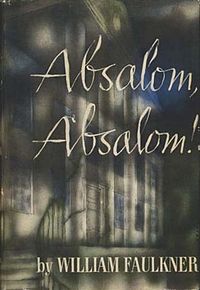Faulkner and Critical Blundering | By Peter LaSalle
 While writing my short story, “The Lost Faulkner Sentence” (NER 32.4), I got to thinking a lot about Faulkner.
While writing my short story, “The Lost Faulkner Sentence” (NER 32.4), I got to thinking a lot about Faulkner.
And one thing I thought of was that, yes, the twentieth century is over, and when it comes to the matter of designating the most important American novelist of that century, somebody who can truly hold his own in terms of international competition, Faulkner seems to have won the race—and by a couple of gracefully gliding, beautifully hoof-beating furlongs, as far as I’m concerned.
No need to go into extensive details of the dazzlement of the large body of his brave, innovative work and how it changed the look of fiction forever. (After the French started translating him in the 1930s, literature throughout continental Europe was never quite the same, and García Márquez, Vargas Llosa, and who knows how many others in the movement that’s commonly called the Latin American Boom later bowed down nearly in unison, to acknowledge that there might not have been even a faint literary pop from that part of the world, let alone such a resounding boom of an explosion in fiction, if it hadn’t been for Faulkner.) Actually, it’s tough to argue against the fact that Faulkner remains among the handful of most significant novelists in all of our history, probably second only to Melville (and one has to wonder if Melville, for sheer originality and on the strength of the one volume alone about his metaphysical leviathan, is really second to anybody worldwide, including Dickens or Tolstoy or Flaubert, even Joyce, for that matter). OK, I think I’ve established my point, the greatness of Faulkner.
Now consider this.
Today Absalom, Absalom! is usually seen as the pinnacle of Faulkner’s overall achievement, a masterfully constructed bridge between modernism and postmodernism in the haunting story of Thomas Sutpen’s megalomania as he built from nothing his vast plantation empire, complete with strange Haitian slaves and a captive foppish French architect, all of it set in a sometimes very nightmarish Mississippi. Yet here is what a certain Clifton Fadiman had to say in his glib New Yorker review when the book appeared in 1936—or at least a couple of snips from the assessment:
—”the most consistently boring novel by a reputable writer to come my way during the last decade”
—”the final blow-up of what was once a remarkable, if minor, talent”
Fadiman was an established critical voice of his day, chiefly remembered—if currently remembered at all—for picking out selections for the essentially middlebrow Book of the Month Club, a guy of the usual variety of supposedly urbane and witty, if maybe comfortably shallow, writer who did grace the pages of the happy-go-lucky New Yorker of that period (perhaps the sort sometimes still found there?). And I suppose it might be easy to forgive him for a gaffe like that, let a statute of limitations for book-review violations come into play.
But I definitely won’t.
If such blundering prevented even one human being from enjoying the rare, undeniably powerful experience on this earth that reading Absalom, Absalom! is, Fadiman should continue to be loudly singled out into perpetuity as the person who said what he did: we can’t be reminded of that kind of pompous and even outright dumb critical behavior enough, as a supremely valuable cautionary tale, if nothing else.
Well, as I said, in writing the NER story I did find myself thinking an awful lot about Faulkner, sometimes getting pretty worked up and huffy, I guess, in the course of that thinking, too.
*
NER Digital is a creative writing series for the web. Peter LaSalle’s 2007 short story collection Tell Borges if you See Him has just been reissued in paperback by University of Georgia Press. A new novel, Mariposa’s Song, which uses a single book-length sentence to tell of a young Honduran woman without documentation working as a bar girl in a rough nightclub in East Austin, Texas, is forthcoming in fall 2012 from Texas Tech University Press. His short story “The Lost Faulkner Sentence” appeared in NER 32.4.



